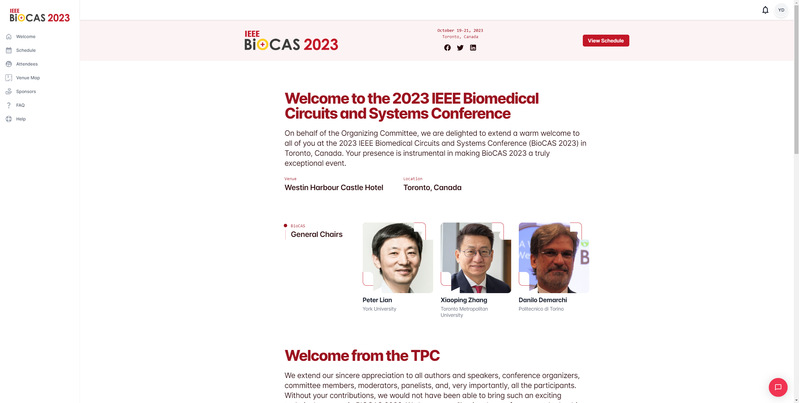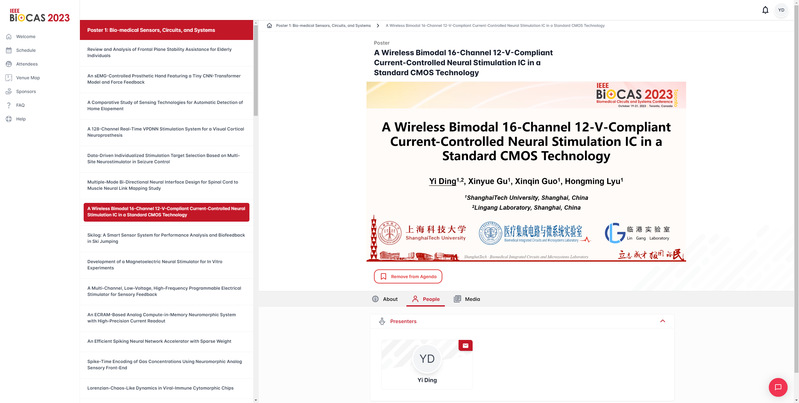2023年IEEE生物医学电路与系统会议(IEEE Biomedical Circuits and Systems Conference, IEEE BioCAS 2023)于加拿大时间2023年10月19日至21日在加拿大最大的城市多伦多举行。IEEE BioCAS 2023是由全球知名的学术机构——电气电子工程师学会(IEEE)主办的专业性学术会议。该会议旨在为生物医学工程领域的学者和研究者提供一个交流和展示最新研究成果、探讨前沿技术的平台。通过展示医学、生命科学、物理科学和工程交叉领域的跨学科研究和开发活动,塑造了未来的医疗设备和医疗保健系统。IEEE BioCAS会议的议题涵盖了生物医学工程的各个领域,包括生物医学信号处理、生物医学图像处理、生物医学传感器技术、生物医学通信和生物医学微系统等。
The 2023 IEEE Biomedical Circuits and Systems Conference (IEEE BioCAS 2023) took place in the largest city of Canada, Toronto, from October 19 to 21, 2023. IEEE BioCAS 2023 is a professional academic conference organized by the globally renowned institution, the Institute of Electrical and Electronics Engineers (IEEE). The conference serves as a platform for scholars and researchers in the field of biomedical engineering to exchange ideas, showcase the latest research findings, and explore cutting-edge technologies. By presenting interdisciplinary research and development activities at the intersection of medicine, life sciences, physical sciences, and engineering, it contributes to shaping the future of medical devices and healthcare systems.The topics covered at the IEEE BioCAS conference span various domains of biomedical engineering, including biomedical signal processing, biomedical image processing, biomedical sensor technologies, biomedical communication, and biomedical microsystems.

课题组投递论文“A Wireless Bimodal 16-Channel 12-V-Compliant Current-Controlled Neural Stimulation IC in a Standard CMOS Technology”并被接受,以海报形式展示在IEEE BioCAS 2023,本实验室2022级博士研究生丁一为该工作的第一作者。2023级博士研究生古昕玥和助理工程师郭新钦参与了本课题研究。吕宏鸣教授为该工作的唯一通讯作者。
The research paper titled "A Wireless Bimodal 16-Channel 12-V-Compliant Current-Controlled Neural Stimulation IC in a Standard CMOS Technology" has been accepted for presentation in poster format at IEEE BioCAS 2023. Ding Yi, a doctoral graduate student from the 2022 cohort in our laboratory, is the first author of this work. The research project also involved the contributions of Gu Xinyue, a doctoral graduate student from the 2023 cohort, and Assistant Engineer Guo Xinqin. Professor Lv Hongming is the sole corresponding author for this work.
论文提出了一种无线双模16通道电流控制神经刺激IC。通过无线控制的脉冲宽度、幅度和相间间隔生成双极双相电流控制刺激。刺激模块采用晶体管叠式拓扑结构,以在低电压CMOS技术中实现12-V电压兼容性。可接收13.56 MHz的无线信号,采用曼彻斯特编码方案,用于生成系统时钟和有效负载数据。并提出了一种新颖的解调方案,支持双模操作,即在超高频率下进行单通道刺激和同时进行多通道神经调制。IC采用0.18μm 1.8-V/3.3-V CMOS技术制造。IC和无线刺激系统的空闲模式功耗分别约为9μW和132μW。测量结果显示系统的成功运行并验证了IC的高电压可靠性。
The paper introduces a wireless bimodal 16-channel current-controlled neural stimulation IC. It generates biphasic current-controlled stimulation using wireless control of pulse width, amplitude, and inter-phase intervals. The stimulation module employs a cascode topology to achieve 12-V voltage compatibility in low-voltage CMOS technology. It can receive a 13.56 MHz wireless signal, utilizing a Manchester encoding scheme for generating system clocks and payload data. Additionally, a novel demodulation approach is proposed, supporting bimodal operation, i.e., single-channel stimulation at an ultra-high frequency and simultaneous multi-channel neural modulation. The IC is fabricated using 0.18μm 1.8-V/3.3-V CMOS technology. The idle mode power consumption of the IC and the wireless stimulation system is approximately 9μW and 132μW, respectively. Measurement results demonstrate the successful operation of the system and validate the high-voltage reliability of the IC.

